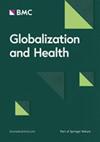Privatisation of government services in Australia: what is known about health and equity impacts
IF 4.5
2区 医学
Q1 PUBLIC, ENVIRONMENTAL & OCCUPATIONAL HEALTH
引用次数: 0
Abstract
Historically in Australia, all levels of government created collective wealth by owning and operating infrastructure, and managing natural assets, key public goods and essential services while being answerable to the public. This strong state tradition was challenged in the 1980s when privatisation became a widespread government approach globally. Privatisation involves displacing the public sector through modes of financing, ownership, management and product or service delivery. The Australian literature shows that negative effects from privatisation are not spread equitably, and the health and equity impacts appear to be under-researched. This narrative overview aims to address a gap in the literature by answering research questions on what evidence exists for positive and negative outcomes of privatisation; how well societal impacts are evaluated, and the implications for health and equity. Database and grey literature were searched by keywords, with inclusion criteria of items limited to Australia, published between 1990 and 2022, relating to any industry or government sector, including an evaluative aspect, or identifying positive or negative aspects from privatisation, contracting out, or outsourcing. Thematic analysis was aided by NVivo qualitative data software and guided by an a-priori coding frame. No items explicitly reflected on the relationship between privatisation and health. Main themes identified were the public cost of privatisation, loss of government control and expertise, lack of accountability and transparency, constraints to accessing social determinants of health, and benefits accruing to the private sector. Our results supported the view that privatisation is more than asset-stripping the public sector. It is a comprehensive strategy for restructuring public services in the interests of capital, with privatisation therefore both a political and commercial determinant of health. There is growing discussion on the need for re-nationalisation of certain public assets, including by the Victorian government. Privatisation of public services is likely to have had an adverse impact on population health and contributed to the increase in inequities. This review suggests that there is little evidence for the benefits of privatisation, with a need for greater attention to political and commercial determinants of health in policy formation and in research.澳大利亚政府服务私有化:对健康和公平影响的认识
历史上,澳大利亚各级政府通过拥有和运营基础设施、管理自然资产、关键公共产品和基本服务来创造集体财富,同时对公众负责。20 世纪 80 年代,当私有化成为全球普遍的政府管理方式时,这种强大的国家传统受到了挑战。私有化涉及通过融资、所有权、管理和产品或服务提供模式取代公共部门。澳大利亚的文献表明,私有化的负面影响并没有得到公平的传播,而且对健康和公平的影响似乎研究不足。本综述旨在通过回答以下研究问题来填补文献空白:私有化的积极和消极影响有哪些证据;社会影响的评估情况如何;以及对健康和公平的影响。通过关键词对数据库和灰色文献进行了检索,纳入标准为:仅限于澳大利亚,发表于 1990 年至 2022 年之间,与任何行业或政府部门有关,包括评估方面,或确定私有化、外包或外包的积极或消极方面。专题分析由 NVivo 定性数据软件辅助,并以先验编码框架为指导。没有任何项目明确反映了私有化与健康之间的关系。确定的主要主题是私有化的公共成本、政府控制和专业知识的丧失、缺乏问责制和透明度、获取健康的社会决定因素的限制以及私营部门获得的利益。我们的研究结果支持这样一种观点,即私有化不仅仅是公共部门的资产剥离。它是一项为资本利益而重组公共服务的综合战略,因此,私有化既是健康的政治决定因素,也是健康的商业决定因素。关于某些公共资产是否需要重新国有化的讨论越来越多,包括维多利亚州政府。公共服务私有化很可能会对人口健康产生不利影响,并导致不公平现象加剧。本研究表明,几乎没有证据表明私有化会带来好处,因此在政策制定和研究中需要更加关注健康的政治和商业决定因素。
本文章由计算机程序翻译,如有差异,请以英文原文为准。
求助全文
约1分钟内获得全文
求助全文
来源期刊

Globalization and Health
PUBLIC, ENVIRONMENTAL & OCCUPATIONAL HEALTH-
CiteScore
18.40
自引率
1.90%
发文量
93
期刊介绍:
"Globalization and Health" is a pioneering transdisciplinary journal dedicated to situating public health and well-being within the dynamic forces of global development. The journal is committed to publishing high-quality, original research that explores the impact of globalization processes on global public health. This includes examining how globalization influences health systems and the social, economic, commercial, and political determinants of health.
The journal welcomes contributions from various disciplines, including policy, health systems, political economy, international relations, and community perspectives. While single-country studies are accepted, they must emphasize global/globalization mechanisms and their relevance to global-level policy discourse and decision-making.
 求助内容:
求助内容: 应助结果提醒方式:
应助结果提醒方式:


